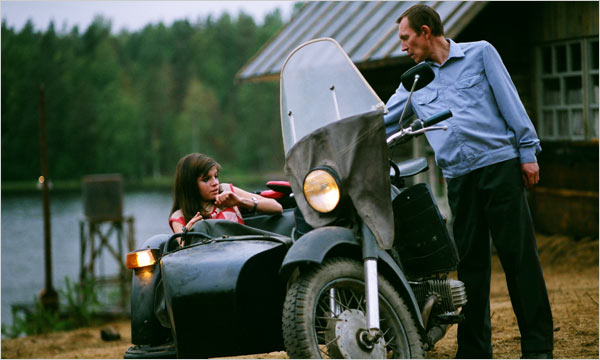|
Reviews of Recent Independent, Foreign, & Documentary Films in Theaters and DVD/Home Video
 CARGO 200
Cargo 200’s nightmarish depiction of the Soviet Union obliterates whatever feelings of Soviet nostalgia that may be surfacing in Putin’s Russia. Director and provocateur Alexey Balabanov sinks his teeth into a profoundly disturbing real-life kidnapping, using its grisly details as a prism for the rotting state of the mid-’80s Soviet machine, just years shy of its collapse. The events unfold in and around a hellish industrial wasteland, near where the car of Artem (Leonid Gromov), a professor of atheism and proud member of the Communist Party, breaks down on the side of the road. Seeking help, he wanders into a tucked-away moonshine distillery run by a boorish alcoholic with dreams of Russia’s religious reawakening. After a drunken debate about Soviet godlessness—the film’s most direct verbalization of the looming ideological shift—the academic leaves and is soon followed by the arrival of a young couple fresh from the local disco. After one too many glassfuls of homemade vodka leaves the boy incapacitated on the floor, his companion—the virginal daughter of a communist official—is kidnapped by Zhurov (Alexei Poluyan), the deeply disturbed watchman, who believes that he is taking for himself a bride. When he’s not tormenting his new ”wife”—sodomizing her, stripping her naked, and handcuffing her to his bed—the psychopathic Zhurov commands the local police force. The terror and corruption perpetrated by him and his cronies is so systematic that the callous murder of a prisoner by the police, among other examples, is carefully staged and all but officially documented. While its on-going perversion may be exaggerated, Cargo 200 accurately taps into the foulness of the decaying Soviet regime. The title refers to the military code word for the coffins of fallen soldiers shipped back for burial from the war in Afghanistan. Though that conflict isn’t central to the film, its futility is used to color in the mood of the ’80s, along with the zeitgeisty mix of restless underground rock and kitschy pop tunes. A darkly ironic scene showing new recruits running onto a cargo plane at the same time as caskets are loaded off works as heavy-handed but biting symbolism of not only the pointless war but of the self-destructive elements about to rip the country apart.
Balabanov condemns
the Soviet Union’s twilight years more brutally than any filmmaker to
date. But unlike the psychological torture of watching Michael Haneke’s
Funny Games (2007), for example, this agonizing look at the dark
recesses of humanity is at least intended as a means to an end. And,
with the benefit of hindsight, the director suggests that the collapse
of communism may have only exchanged one putrid and corrupt lifestyle for another.
Yana Litovsky
|

